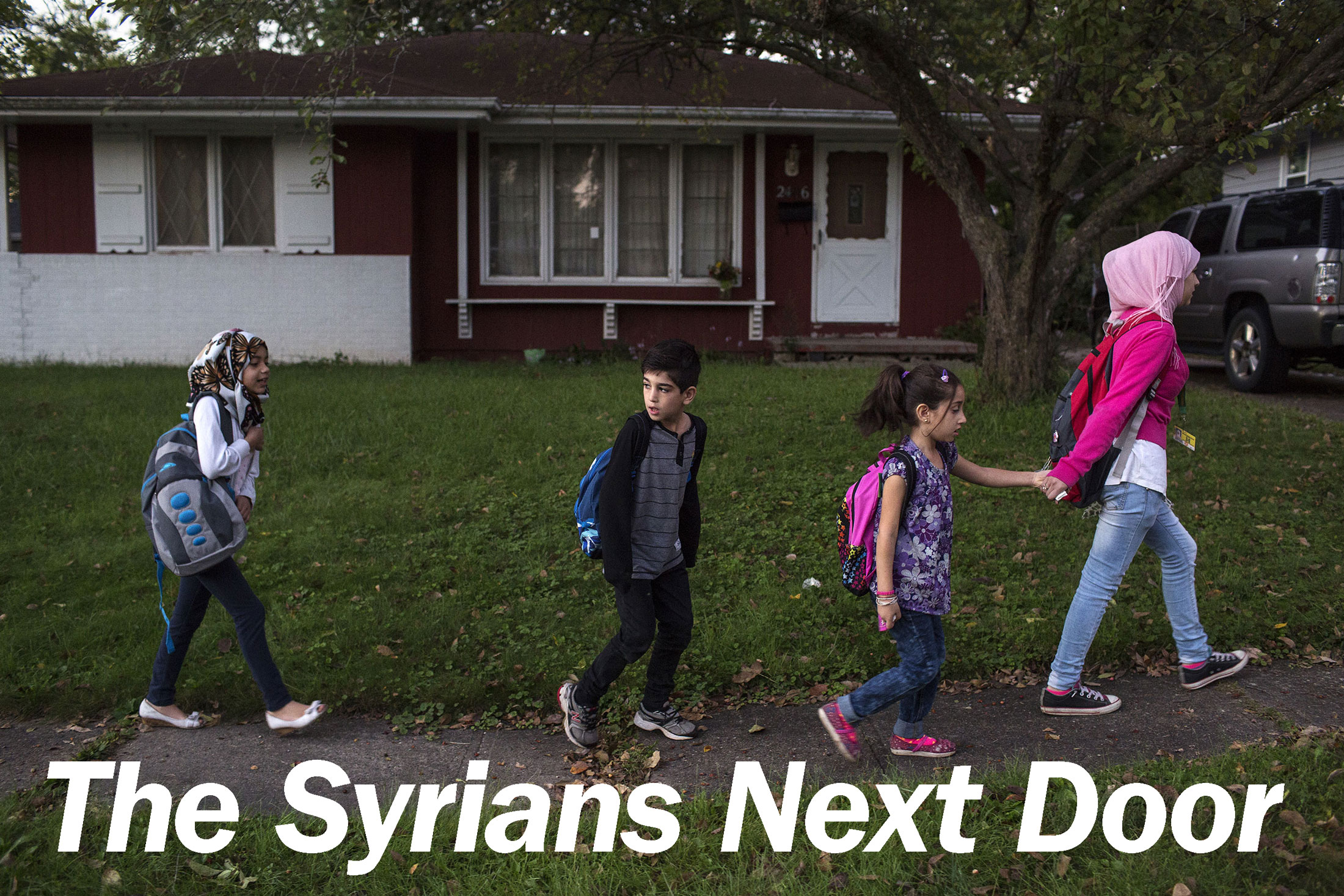Two years after fleeing their home, the Tameem family became the first Syrian refugees in Iowa
By Robin Shulman/Des Moines
Photographs by Danny Wilcox Frazier for TIME
As the plane descended at night over farm fields, Ghazweh Aljabooli reached for her 6-year-old daughter Hala. The girl was sobbing, just as she had at every takeoff and landing over the past 30 hours, “My ears hurt!” She wailed it on the flight from Amman to Paris, the flight from Paris to Houston, and now on this final leg into Des Moines. Ghazweh’s older children craned to see out windows that revealed only blackness—nothing of their future.
When the passengers filed off the jetway, Ghazweh herded her five children into the concourse and looked around, unsure of what to do next. Her husband clutched a sealed white plastic bag with the insignia of the International Organization for Migration. He had been told to keep the bag visible during their trip: something of a secret code of airports, it signaled at every stop that they were refugees who needed an escort to the next flight. But now there was no next flight, or any sign of help. Ghazweh worried about what happened next—would someone be waiting?
The family followed the stream of tall, sturdy Midwesterners toward baggage claim. And then, at the bottom of an escalator, a man waited with a smile. “Ahlan wa sahlan,” he said: “Welcome.” Suddenly, Ghazweh’s eyes filled with tears. “I was so scared,” she said, at the end of a journey that had really begun five years before.
Ghazweh’s family had been middle class in Syria, with lives marked by school plays and holiday vacations. But everything was upended by the war that started there in 2011. The family endured siege, and bombardment destroyed their home. The painful decision to flee led to a nomadic month in the desert before they escaped into neighboring Jordan.
Two years in limbo followed, as the U.N. processed the family’s application for resettlement and U.S. government agencies conducted background and security checks. Finally, on a June night, the Tameem family became the first Syrian refugees in Iowa—only to find themselves on the front lines of another conflict, this one over them.
As battles go, the fight over admitting Syrian refugees to the U.S. is really more of an argument. But it’s a heated one that has been at the center of a particularly charged presidential contest. Republican nominee Donald Trump launched his campaign with a screed against immigrants, insisting that Americans needed a wall along the border with Mexico to keep out “rapists” and other undesirables. After terrorist attacks by Islamist extremists in San Bernardino, Calif., and Europe, Trump shifted his ire to Muslims, calling for them to be barred from entering the U.S. He repeatedly singles out as unacceptably risky any refugee from Syria’s civil war, the conflict that breathed life into ISIS and sent millions fleeing the country.
Other political leaders have echoed his sentiments. Although the decision to admit refugees is made by federal authorities, 31 governors have said they don’t want fleeing Syrians in their states. Iowa Governor Terry Branstad was one of them.
But so far the threat, like the debate, has been abstract. Most Americans have never met a Syrian refugee. Before this spring, the Obama Administration had let in a relatively small number––about 3,000, compared with more than 30,000 resettled in Canada. That began to change over the summer and fall when about 10,000 Syrians arrived, settling in cities and towns across the U.S., where they have been met with a mix of open arms and angry protests. And so for at least some Americans, the debate is about to become far more personal.
“You made the right choice,” the man from the airport tells the Tameems. They are in a gray Chevrolet van, being driven toward town. The new arrivals are in a strange new land, it’s dark, and the man, Yasir Al Imami, who was born in Iraq and was a refugee himself a few years earlier, keeps up a steady murmur of reassurances. “You made the right choice,” he says again. “You will be safe here.”
On their first night in America, Ghazweh and her husband Abdul Fattah Tameem are so excited, they don’t sleep. Instead, around 3 a.m. they leave the hotel where they have been taken—their landlord is paying, since their apartment is not yet ready—and go for a long walk. “It’s so beautiful and so quiet and calm,” Ghazweh says. The grassy expanses and the reflective Des Moines River remind them of Homs, their home city, north of Damascus. But in the predawn streets of Des Moines, there are no honking cars, bustling markets, or even people. Only at the end of their walk do early-morning joggers and commuters appear, as the sun rises and lights their pathway.
Al Imami returns in the morning. As their assigned caseworker with the U.S. Committee for Refugees and Immigrants (USCRI), a nongovernmental resettlement agency, he brings information about Social Security cards, health insurance and school registration. Ghazweh and Abdul Fattah kneel on the hotel-room floor, signing dozens of pieces of paper. They know no English. Al Imami explains that they have six months before government aid runs out and they must support themselves.
“My advice is to start work as soon as possible after we finish the paperwork,” he says. Abdul Fattah smiles and nods. “I’m with you,” he says.
The kids watch closely. Observant, long-haired Nazeer, 15, is the oldest. Shy Sedra is 13. Haidar, quiet and handsome, is 11. The youngest are twins: Hala and her brother Mutaz.
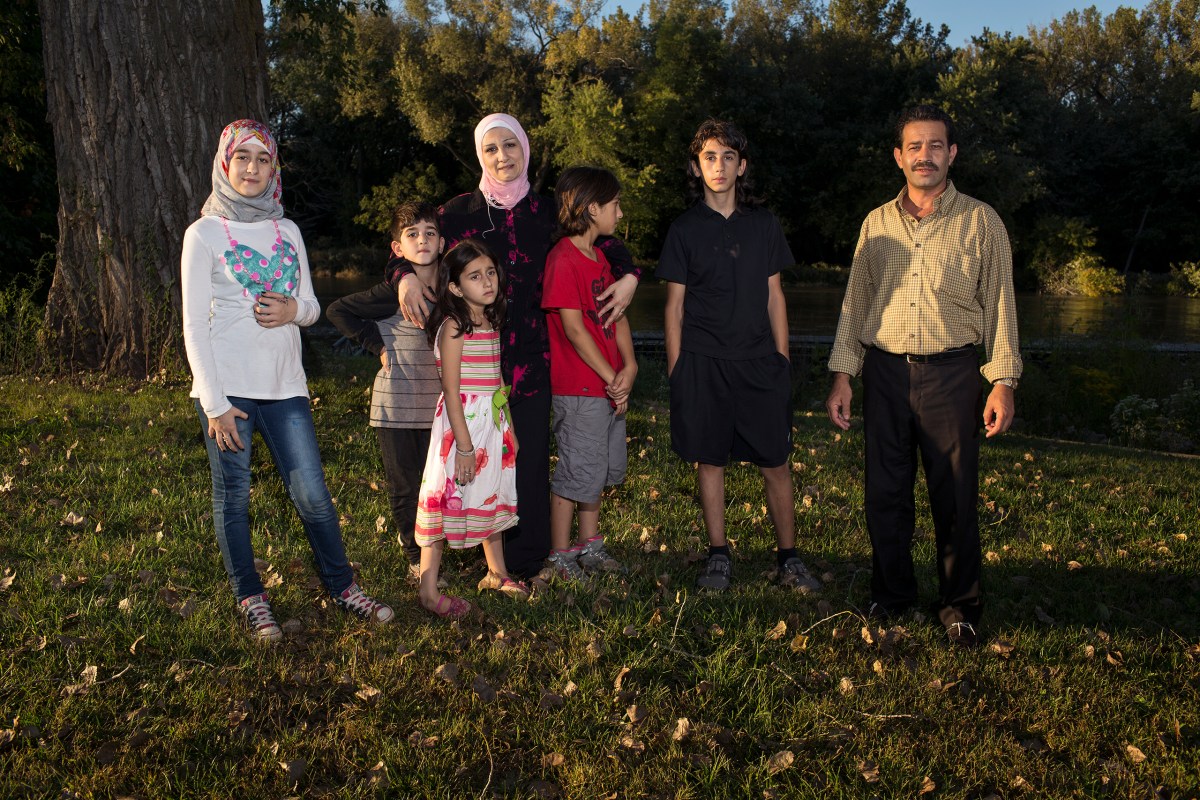
Paperwork done, they all pile into the gray van to drive to their new home, Abdul Fattah still holding the bag from IOM. They are the first family to move into a former nursing home freshly renovated as apartments. USCRI has rented every unit in the building. Soon it will become a veritable U.N. in America’s Corn Belt.
The drive to their new home takes them past a Family Dollar store, rundown apartments, some vacant lots and a decrepit-looking sports bar. “Where are the people walking in the street?” Ghazweh asks. They park in front of a tan, one-story, aluminum-sided building. Abdul Fattah holds open the apartment door, and Ghazweh enters ahead of him. It’s a comfortable, freshly painted four-bedroom. The kids run to survey the rooms. Each bed has a handmade quilt donated by a local quilting group, with a stuffed animal on top. “There’s a teddy bear for me!” Hala says, beaming.
In the kitchen, Al Imami opens cupboards to show the housewares—some donated, like the Christmas-themed hand towels; some purchased at places like Salvation Army. He followed federal guidelines and supplied at least one fork, knife and spoon for each family member. And he stocked the fridge, freezer and cupboards: flour, oil, milk, eggs, rice, halal-beef strips, hamburger meat, four chickens. “I hope you like it,” he says, shyly.
In the following days, the house fills with people. An Iowa family, upset about what they see as “ugliness” toward refugees, volunteers to help acclimate the Syrians. A 61-year-old woman named Marilyn Hansen takes down the kids’ ages and shoe sizes and solicits bedding, housewares, clothing, school supplies and appliances from her friends. A Syrian professor and her family––one of four Syrian families the resettlement agency has identified in town––stops by to welcome them.
Ghazweh feels overcome by happiness, and then by bewilderment. At 36, she is slight, with enormous, expressive eyes and a scarf covering her hair. She can seem fragile. Then you see her children orbiting around her, and her strong hands, always reaching for one of them, and are reminded that Ghazweh held her family together through war. This new life feels like a dream. “I’m wondering . . .” she says, as though articulating a thought that has been turning over in her mind. “Will we come back to life?”
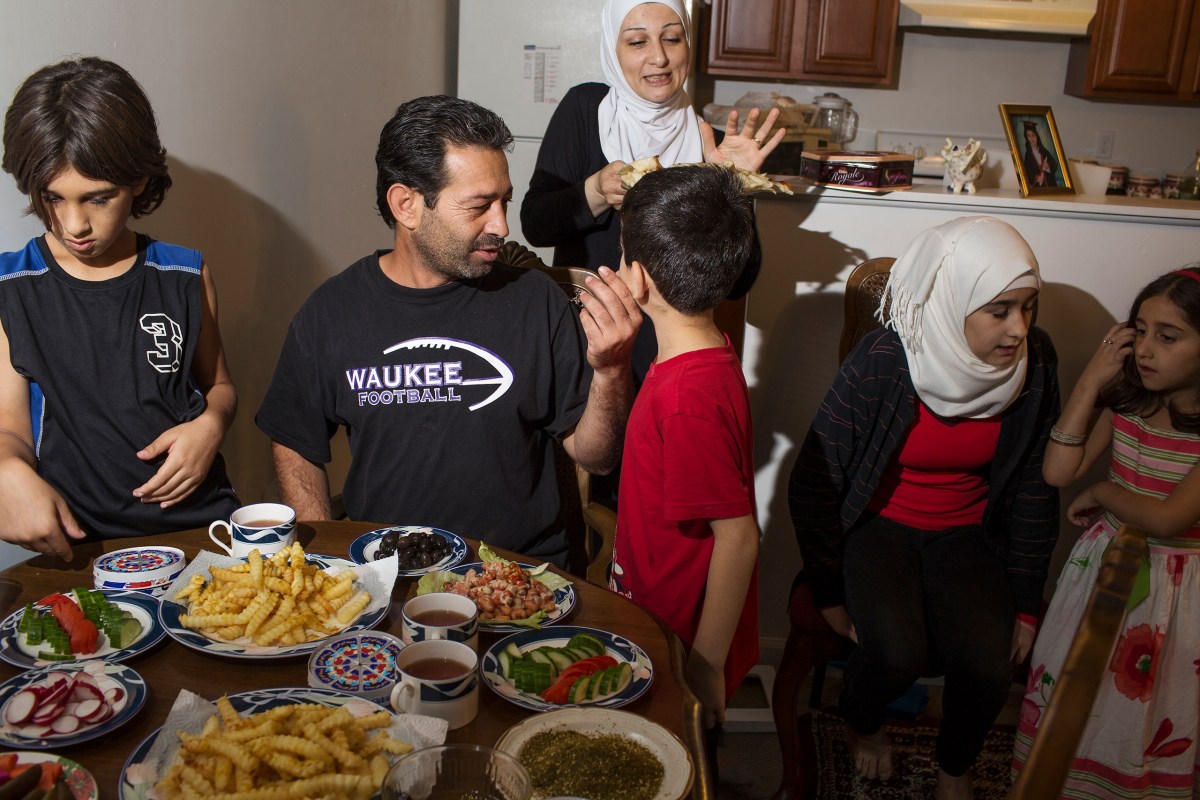
She might be forgiven for wondering. Neither Ghazweh nor Abdul Fattah had any idea that the antigovernment protests that began in spring 2011 would spark a conflict that would kill more than 400,000 people and force about half the country’s population to flee their homes, including 5 million who left the country. On Haidar’s first day of first grade, a tank parked outside the school, shooting. “No big deal, it’s just loud,” Ghazweh tried to reassure the kids. And for a while, life went on. The children still walked to school holding hands with their cousins; Sedra’s class performed Little Red Riding Hood; Nazeer’s class visited a farm.
Then snipers started shooting kids. After about a month, the school closed and the children never went back. Hala, then about 18 months old, was diagnosed with calcium deficiency, Ghazweh said. She was supposed to drink plenty of milk and take calcium and vitamin D supplements. But there was a siege, and they ran out of powdered milk. Ghazweh would fill baby bottles with water mixed with cornstarch or crushed biscuits. Plump as a baby, her mother says, Hala became a small, sickly toddler. She arrived in Des Moines with brown marks on her teeth and swollen, bleeding gums.
The twins do not remember a time before the war. They recall the whooshing sound a bomb makes when it drops from a plane. They know that when the bomb lands nearby, the whole building shudders and solid walls can ripple like water. When the shelling started, the family often squeezed themselves into the cabinets under the kitchen counter. At night, all five of the kids would climb into their parents’ bed and hide under the blankets. “You want to find a safe place to hide the children,” Abdul Fattah says. “But there is no safe place.”
Ghazweh and Haidar sometimes had bleeding in their ears from the pressure of explosions, they said. Hala would shake in terror and get fevers. Haidar would pass out. One of Ghazweh’s brothers was paralyzed in a bombing, and another died, she and other relatives said.
Eventually the family went to stay with relatives in another city. While they were away, neighbors called to say a bomb had struck their home. That summer, in 2013, they tried to go to Jordan, but the border was closed. They camped out in the desert, waiting—only to give up and go back. Finally that winter they crossed into Jordan and registered with the U.N. as refugees, an official status granting them international protection. Abdul Fattah went to have his iris scanned so he could pick up regular payments. The neighbors gave them dishes and cutlery. But Ghazweh grew depressed watching YouTube videos of Homs on her phone. “Everything I knew was destroyed,” she said.
Jordan, already awash in refugees, was not welcoming. Abdul Fattah was not allowed to work there. Women would elbow Ghazweh in the street and hiss “Syrian,” like an epithet. The Jordanian kindergartners made fun of Mutaz for his long hair. Sedra, who excelled in school, was taunted, “Hey Syrian girl, why do you think you’re better than us?” Boys beat up Haidar and Nazeer.
The question was whether to leave or remain in hopes the war would soon end. Two of Ghazweh’s brothers had applied to be resettled in Canada. Now U.N. officials asked Abdul Fattah and Ghazweh if they wanted to be resettled, and why. “I put everything in me into answering this question,” Ghazweh said. “I thought, I want my kids to live their lives.” Abdul Fattah was reluctant, but Ghazweh pressed him, for the kids.
It does not happen quickly. All refugees who request resettlement in the U.S. must provide biometric and biographical data. They are screened by the National Counterterrorism Center, the FBI, the Defense Department, the State Department and U.S. Customs and Border Protection. Syrians also go through the Syria Enhanced Review, conducted by analysts knowledgeable about the networks of armed groups in the civil war. Vetting takes 18 to 24 months.
The Tameems passed every stage. About two years after they arrived in Jordan, officials called offering resettlement. Ghazweh was so excited, she jumped in the air.
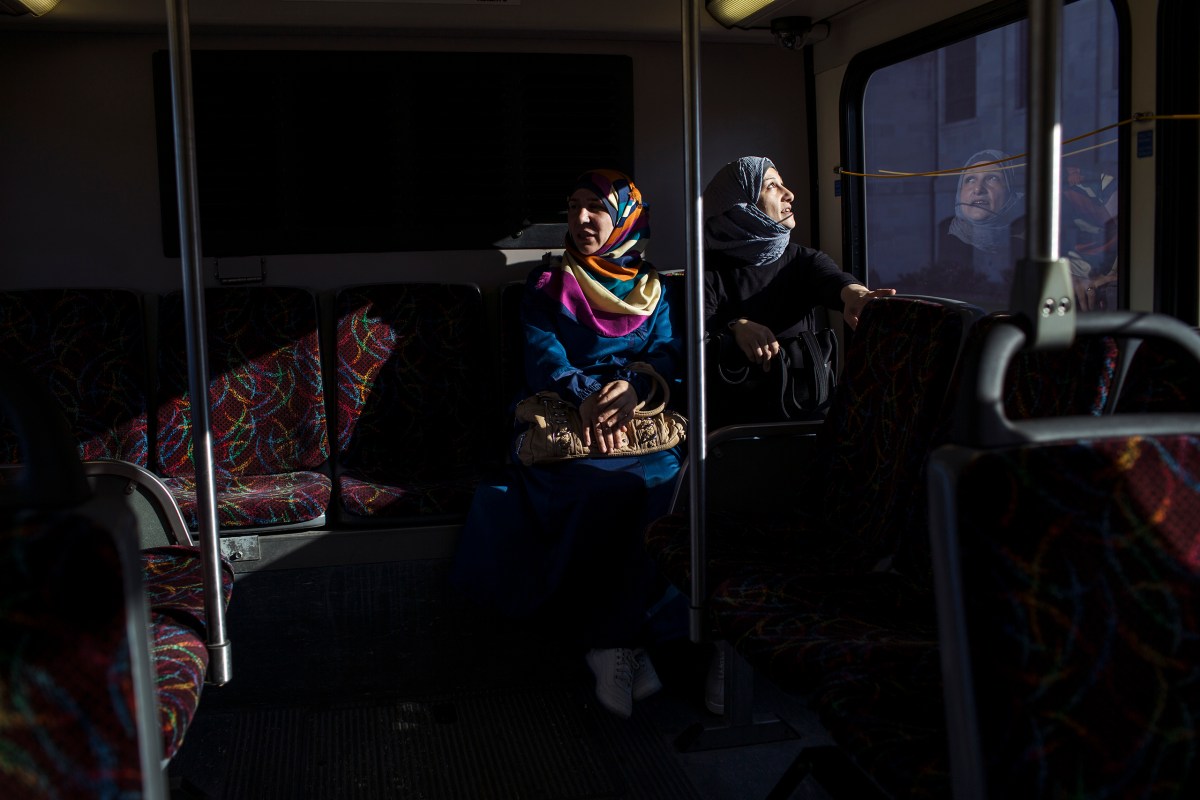
Six weeks after arriving in Iowa, Ghazweh and Abdul Fattah get jobs at a hotel—Ghazweh as a housekeeper from 8 a.m. to 4:30 p.m., and Abdul Fattah in the kitchen washing dishes from 5 p.m. to 11 p.m. Ghazweh has never had a paying job, but now she wakes before 5 to put on her housekeeper’s outfit with a matching blue veil. The ride to the hotel involves two buses and takes about an hour and 45 minutes. Google Maps says the same distance takes 17 minutes by car.
“Housekeeping!” Ghazweh calls out, knocking on door 624. Ghazweh and her partner, an immigrant from Mexico, work at high speed. Ghazweh stuffs the sheets into a blue bin and pulls out fresh ones folded into neat squares. She shakes new pillowcases crisp, then worms each pillow into a tube and encases it. Some days, she says, they clean 36 rooms together.
Ghazweh has already decided she won’t work here long. She wants to study English and be home after school to take care of the kids. And as a traditional Arab woman, she says, she feels ashamed entering the bedrooms of strangers. Abdul Fattah hopes to get a second job so they can make their rent. “It’s a lot of pressure,” he says. In Syria, his earnings as a housepainter in a family business allowed them to own their home and vacation on the Mediterranean. Here, the rent of about $1,570 is more than his monthly take-home.
Only beginning to learn English, without Arabic satellite-TV channels and lacking a laptop or Internet connection, Ghazweh and Abdul Fattah don’t know much about the ways immigrants have been talked about in the 2016 election. But they know others are afraid. An Iraqi volunteer helping Syrians has been reassuring other newcomers that America has laws to prevent someone from taking power and behaving like an Arab dictator.
But fear and uncertainty work at the edges of their lives. Marilyn Hansen comes to drop off school supplies and freshly laundered winter coats. She says her sister, a Trump supporter, contributes a good portion of the donations she brings—“she has a real helpful heart.” But it’s an uneasy generosity. “She did ask me one day if I was ever scared when I was with the families,” Hansen says. “I said, ‘Absolutely not, there’s nothing to be afraid of.’”
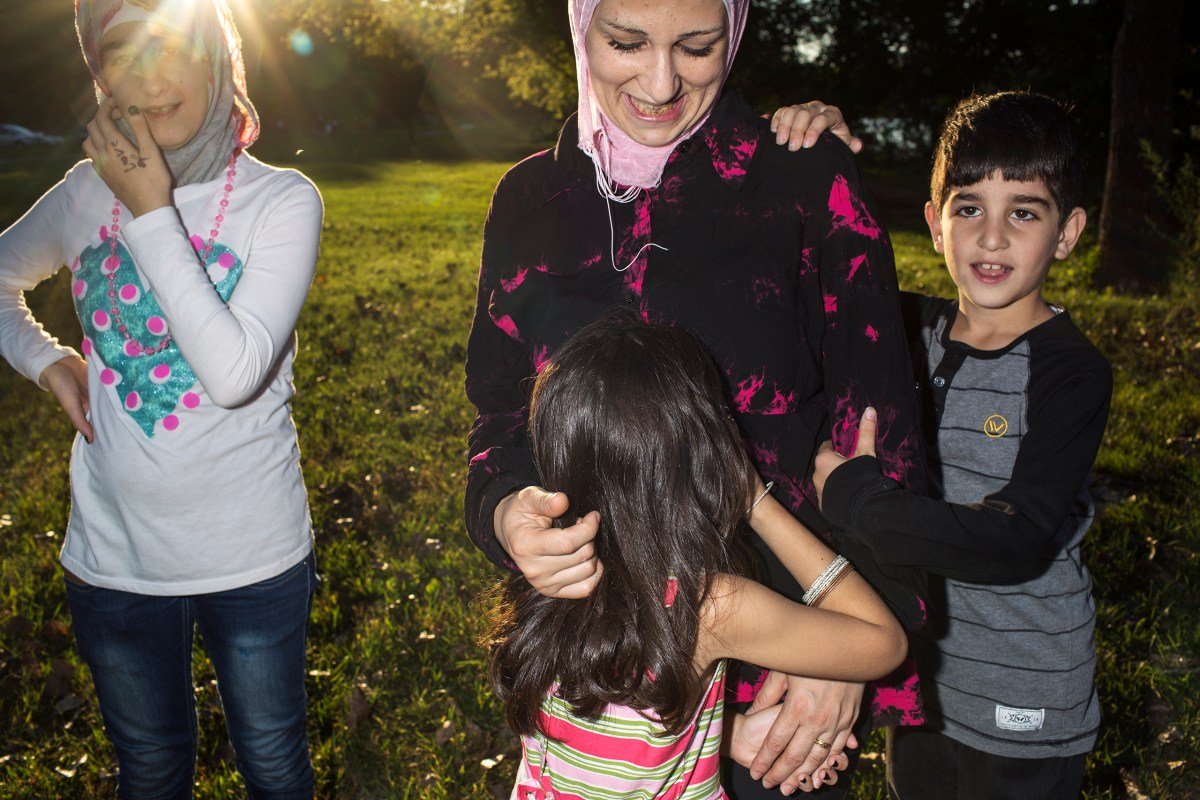
Iowa has a long history of welcoming outsiders. The state was populated by families from northern Europe in the 19th century; Syrians came to Cedar Rapids in the late 1800s and helped open one of the nation’s oldest mosques in the 1930s. Southeast Asians fleeing war found a home in the state in the ’70s, followed by Eastern Europeans, Bosnians and more recently Somalis, Nepalese, Congolese, Burmese. Yet the prospect of taking in this latest wave of migrants has put many Iowans on edge.
One manager at Ghazweh’s hotel, also a Trump supporter, says she’s happy to help individual refugees but feels nervous that Syrians are coming to Iowa. “We’ve let a lot of people in who want to harm us,” she says in the hallway, while another immigrant housekeeper vacuums. Some people deserve a safe haven, she allows—“as long as they’re not a person that blows up my church.”
The controversy over their arrival is largely lost on the Tameems, who, over the course of the summer, begin to feel at home in the heartland. Ghazweh seems to be settling into herself, growing more confident and curious. Long taciturn, Abdul Fattah has become more outgoing. Sometimes when they’re out together, he reaches for her hand. Ghazweh wonders if it’s his way of expressing appreciation for her efforts to bring them here. “I’m proud of my wife,” Abdul Fattah says in August. “She is the ideal woman.”
The children are beginning to settle in too. Nazeer leads neighborhood kids on exploratory missions, wandering for hours over highways and under bridges to different parts of town. He found a lake and taught himself to fish by watching YouTube videos on an old wi-fi-enabled phone, using bread as bait in a cut-off plastic Coke bottle.
Mike Rother, a welder and Trump supporter who lives across the street, says he had misgivings about living near Syrians but has come to realize his worry was misplaced. “Obviously, they’re not bringing anything but children playing outside,” he says. “I see kids kicking a soccer ball, riding their bikes, playing with each other. They wave to me and say ‘Hi’ and want to pet my dog.”
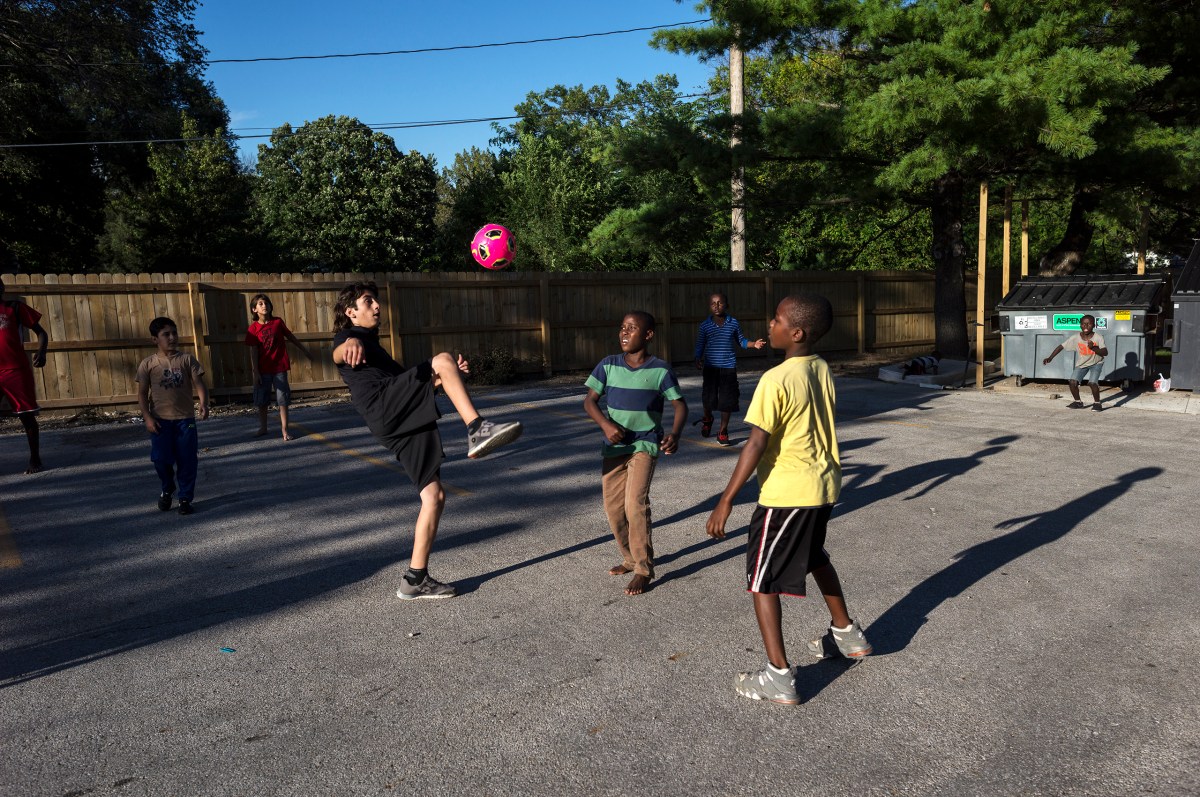
At 5 a.m. on the first day of school, Hala lies in bed in the half-light of a pink lamp on a bedside table. Outside is the crescent moon in a starry sky, the chirp of cicadas. Hala slept in yesterday’s clothes, pink leggings and a pink T-shirt. She falls out of bed and stands up, eyes closed, hugging her mother, with that ability of young children to half-sleep while standing.
In the kitchen, Ghazweh boils water and scoops up spoonfuls of Nido, a sweet powdered milk, into five mugs. She sits Hala on her lap and brushes her hair. “Go get the stars,” Ghazweh says. Hala comes back with a handful of brightly colored, star-shaped clips, and Ghazweh fastens each into Hala’s chestnut hair.
When Mutaz offers her an apple, Hala wrinkles her nose. “My teeth hurt,” she whispers. No one has made a dentist appointment—Ghazweh isn’t sure whom to ask. Hala leans back, and Ghazweh pours a spoonful of pink Hy-Vee children’s ibuprofen into her mouth.
The five children go to three schools. Nazeer is at Hoover High School, where the hallways fill with cheerleaders and football players. Sedra and Haidar are in middle school, and the year opens with a pep rally. “Give me an H! Give me a U!” they scream for the Huskies—though they don’t yet understand the idea of a mascot, or the game of football.
Hala and Mutaz’s elementary school is new and bright, filled with kids who came to Iowa from some of the most violent places in the world—Somali girls in sherbet-colored jilbabs, Salvadoran boys with cropped hair and stuffed backpacks, Congolese girls in new sneakers and braids.
On the twins’ bus ride home, the kids divide themselves by nationality—Nepalese in one cluster, Mexicans in another, Hala and Mutaz with a group of other Syrians who arrived after them. It’s hot, even with the windows open. The gray vinyl seats are sticky with sweat. “Does anybody get off at 13th?” the bus driver calls out. The children are silent.
“I have never driven a bus where nobody speaks English,” the driver says. One student misses her stop. Another gets off a stop before he’s supposed to. The bus circles back and radios in, and falls further behind. Hala falls asleep against the window, her brown hair mussed in the humidity, her star clips askew.
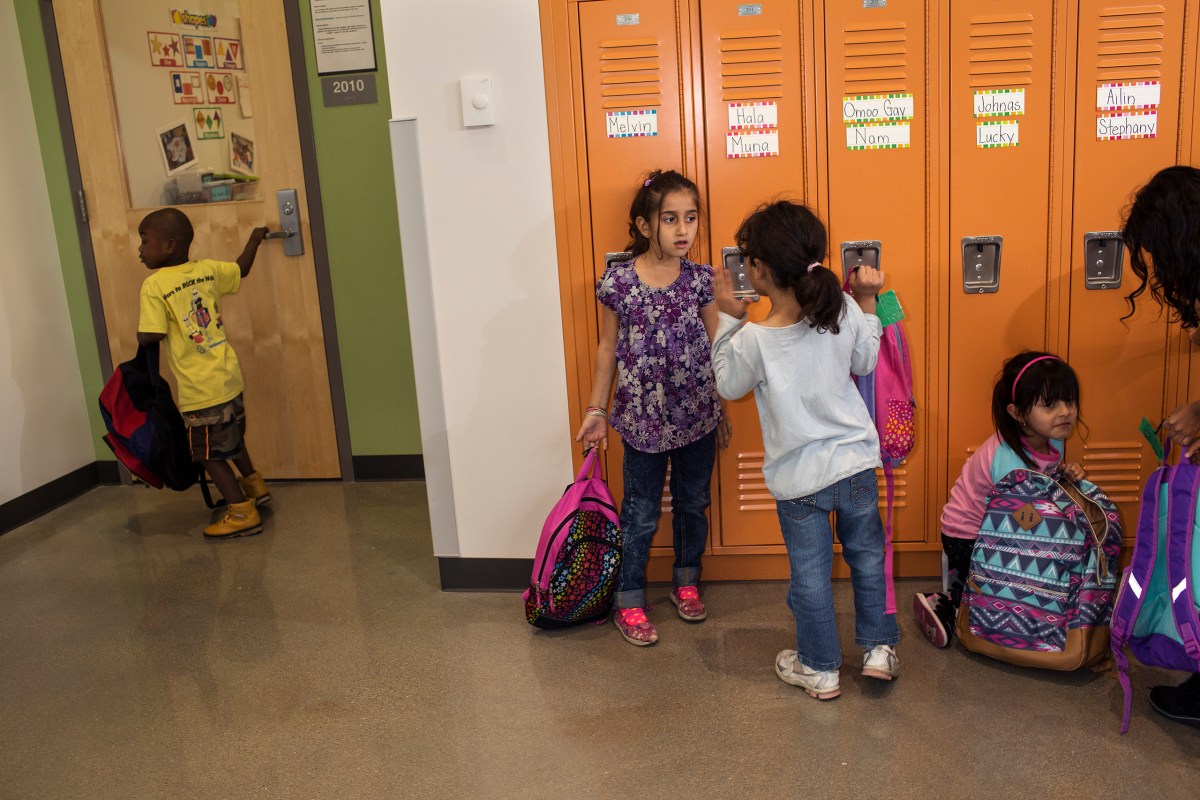
Finally, more than two hours late, the bus drives into the Tameems’ neighborhood. When Hala and Mutaz open the door, Ghazweh grabs her youngest daughter and buries her face in her hair. “Where were you?” she asks. Ghazweh had been scared. But here were her children, venturing out into the world and coming safely home. A few minutes later, she’s laughing again.
The next day, the family goes swimming after school at a lake in Des Moines. The sun is still high in the sky, warm but not too hot. Haidar slips off his shirt and dives in. Ghazweh takes off her shoes and wades in too, laughing as the water darkens her black pants. The boys swim out with a ball and play catch. Hala chases her sister along the shore.
Ghazweh takes stock. They have a future, she says, where they didn’t before. They are at a lake in the sun, together, safe. “I’m happy,” says Ghazweh, in Arabic, smiling toward Hala. And then she says it again, haltingly, grinning, in English: “I am very happy.”
This story was reported with a grant from the Pulitzer Center on Crisis Reporting
Nov. 3, 2016
